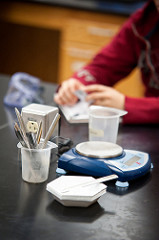Changing grade levels
By Mary Bigelow
Posted on 2016-07-16
 Next year there will be an opening in the high school science department. Although I love teaching middle school, I’m tempted by the opportunity to try something different and use more of what I majored in (chemistry). What advantages and disadvantages should I consider?—C., New Jersey
Next year there will be an opening in the high school science department. Although I love teaching middle school, I’m tempted by the opportunity to try something different and use more of what I majored in (chemistry). What advantages and disadvantages should I consider?—C., New Jersey
Taking on new subjects or grade levels can be exciting and professionally rejuvenating. It can also be a lot of work, almost like starting over.
I was in a similar circumstance with an opportunity to switch to a high school program. Reflecting on the experience, I think that being a middle school teacher is excellent preparation for high school. My middle school experience gave me a relaxed, off-beat sense of humor and helped me to deal with high schoolers who needed different instructional approaches or more time to learn a concept. Engaging with high schoolers in spirited discussions and in high-level investigations was intellectually exhilarating (although I still have a soft spot for middle schoolers). But I don’t regret taking on a rewarding challenge that enabled me to grow professionally.
You’ll notice some differences in the students. Even though they try hard to act like adults, most middle schoolers are still basically kids, with high levels of energy and enthusiasm. The challenge is channeling their energy and enthusiasm, and since most of them like science, this isn’t hard to do. High schoolers on the other hand often seem to be distracted by non-classroom issues, such as social media, their personal lives, extracurricular activities, and jobs. They have internalized what school is supposed to be like and may balk at doing something different. Generating energy and enthusiasm was often the challenge (I had to get used to eye-rolls and heavy sighs). But I did enjoy interacting with the older students and helping them become more independent learners.
Assuming you’re in the same district or attendance area, you’ll know many of your students from their middle years. When these students say they have never heard of atoms or never had to write a lab report, you can remind them that you were there. But you still may have to reteach skills you thought they had mastered such as organizing, notetaking, graphing, and technical writing.
There are also some practical considerations as you make your decision:
- Be sure you have the appropriate credentials for the science course and electives taught at the high school.
- Visit the high school ahead of time and look at the environment from the perspective of a teacher there. You should check out your potential classroom/lab, the technology, safety equipment, and other resources. If the classroom/lab is physically different from your middle school environment, you may need to modify some of your instructional and classroom management procedures.
- Ask if the district safety officer will be available to assist in inventorying and any cleanup of chemicals or other materials.
- Ask for a copy of the curriculum, textbook, online materials, and other resources to review ahead of time. Your collection of lessons, assessments, and materials may no longer be appropriate, so you’ll have to spend time creating or adapting materials and lab investigations.
Middle schools often have professional learning communities or teams with common planning time. However, the high school schedule might not allow opportunities for teacher collaboration during the school day.
As you change schools, you’ll have to get used to new schedules, a new culture, and a new group of colleagues. It would be helpful to have the student and faculty handbook ahead of time and a go-to person to answer questions and share resources and information. Try to find a colleague who also changed teaching positions and pick his or her brain about what to expect.
It’s a humbling experience as a veteran teacher to realize you may not have all of the answers right away in a new situation and that you’ll make some mistakes. Give yourself permission to learn along with the students.
But you already have a strong foundation in the subject, and you’ll be able to help students see the connections between chemistry and other subjects. You already have a repertoire of strategies for instruction, assessments, lab safety, and classroom management. And if you decide to make the switch, you’ll have the chance to clean out your file drawers!
Photo: http://www.flickr.com/photos/jeremywilburn/5229139935/
Disclaimer: The views expressed in this blog post are those of the author(s) and do not necessarily reflect the official position of the National Science Teaching Association (NSTA).


